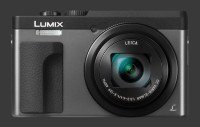Best Digital Cameras of 2017
Introduction
This is the time of the year when Neocamera recognizes the very best cameras in their class. While technology has been improving at a rapid pace, the introduction of new digital cameras continues to slow down. Cellular phones now have the ultra-compact market and so only a single ultra-compact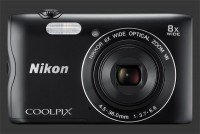
Nikon Coolpix A300 was introduced in 2017. Compact cameras fared slightly better with 8 new models providing features that phones have yet to acquire, either a long zoom or a rugged waterproof body, which accounts for half of new compact digital cameras unveiled this year. Only two medium-sized cameras, the Fujifilm X100F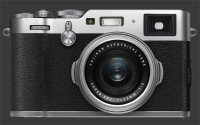
Fujifilm X100F and the Canon PowerShot G1 X Mark III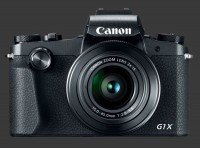
Canon PowerShot G1 X Mark III, made their debut this year, so competition is thinning.
Given that we skipped 2016 due to time off, this year the Best Digital Cameras will be taken from 2017 and 2016 models. All these cameras are still easily available but do not fear going back further. Many models awarded for 2015 remain among the best-in-class, most notably the Compact and Premium category winners.
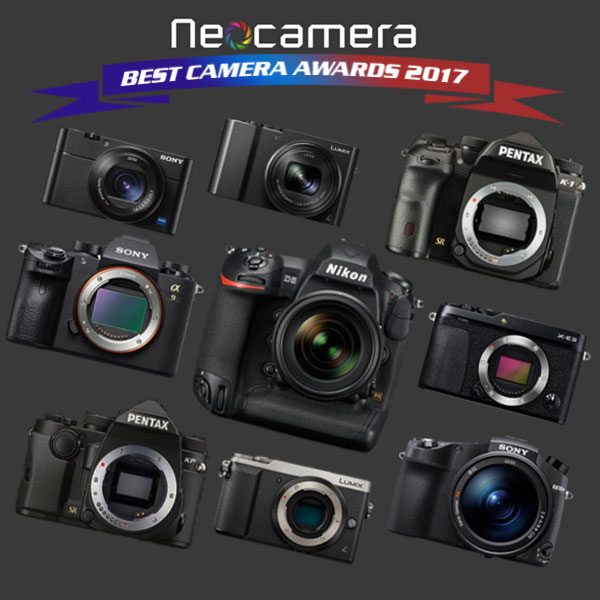
One thing that has dramatically changed over the last year is the price-range of digital cameras. As manufacturers make fewer models and number of sales go down, the average and maximum price per digital cameras has been going up. It is now possible to pay well over $1000 USD for an ultra-zoom and over $3000 USD for a mirrorless. As we recognize that the best-in-class model may not be afforable to many consumers, most categories now include a budget option that still delivers exceptional results among its peers.
Without further ado then, we present right here the Best Digital Cameras of 2017.
Travel-Zoom
Travel-zooms are small digital camera boasting high-powered optical zoom lenses. This makes them highly desirable for taking pictures while travelling. They are the size of a typical compact camera, which is smaller than the average cellphone, while offering at least 8X optical zoom.
Despite their clear advantage over cellphones, it has been a slow year for Travel-Zooms with only 3 models introduced in 2017. The previous year, we saw 10, so here we choose among the 13 launched in 2016 and 2017 together.
Best Travel-Zoom 2017
Panasonic Lumix DMC-ZS100
Only one model truly distinguishes itself among its peers and that is the Panasonic Lumix DMC-ZS100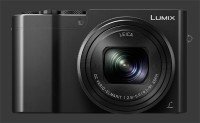
Panasonic Lumix DMC-ZS100. This cameras features the largest sensor in its class, a 20 megapixels 1" High-Speed CMOS sensor often seen in Premium digital cameras. This lets it capture 4X more light than any other Travel-Zoom which results in much improved image quality and better performance in low-light.
The high-speed CMOS sensor plays a big part in the performance of the ZS100, making it possible to shoot continuously at a whopping 50 FPS, record 4K Ultra-HD video and perform Post-Shot Focusing. Sweeping Panorama and a high-speed electronic shutter which tops at 1/16000s provided added flexibility stemming from having a high-speed sensor..
The 10X stabilized optical zoom lens of the Panasonic ZS100 is equivalent to a versatile 25-250mm which is suitable for a great variety of subjects. This travel-zoom offers full manual-controls and a small 0.2" EVF with Eye-Start sensor for use in bright light.
| What you will like |
|---|
| Excellent image-quality for its size and zoom |
| Very good dynamic-range |
| Low image noise |
| Reliable metering |
| No distortion or vignetting |
| Very fast and responsive |
| Excellent LCD visibility |
| What you may not like |
| Lens softness, much worse along edges |
| Below-average color accuracy |
| Very dim at telephoto |
| Highly variable AF |
| 1s Filming delay |
| Very short battery-life |
Budget Travel-Zoom 2017
Panasonic Lumix DMC-ZS70
Among a handful of Travel-Zooms actually introduced in 2017, Panasonic scored another compelling offering. Sporting a conventional-sized 20 megapixels 1/2.3" High-Speed CMOS sensor rather than the large 1" one in the ZS100, the ZS70 sells for around $400 USD instead of $700 while keeping many of its siblings unique selling points.
The smaller sensor allows the ZS70 to offer a much more powerful 30X optical zoom, equivalent to 24-720mm and still optically stabilized. The high-speed CMOS sensor delivers a sufficiently high throughput to record 4K Ultra-HD video and shoot continuously at 10 FPS.
Panasonic packed a good amount into the ZS70 with a small 0.2" built-in EVF and dual control-dials plus a advanced features such as 7-shot Auto-Exposure Bracketing, White-Balance Fine-Tuning, Manual Focus and RAW capture.
| What you will like |
|---|
| Good metering system |
| No distortion or vignetting |
| Quite responsive |
| 4K Ultra-HD video |
| Built-in EVF with Eye-Start Sensor |
| Excellent LCD visibility |
| What you may not like |
| Noisy images from ISO 400 |
| Loss of details due to noise-reduction |
| Pronounced softness at wide-angle |
| Below-average color accuracy |
| Very dim at telephoto |
| Highly variable AF |
Premium Compact
Premium Compacts are fixed-lens digital cameras with an extensive feature set in a relatively compact body. They rarely fit in a pocket but neither do other cameras with the same feature set. Sensor-size has been getting bigger among premium compacts, delivering very good image quality.
While we saw Premium Compacts grow rapidly in 2015, these have a longer life-cycle than standard compact cameras to accommodate a smaller market. Since then, only a handful of new premium compact cameras were launched. Their Premium status commands an equally high price which puts them in competition with entry-level mirrorless that offer more versatility at the expense of complexity. This is also means there are no budget cameras in this category, all Premium Compacts fall between $700 and $1300 USD.
One of the very best premium compact cameras remains the Panasonic Lumix DMC-LX100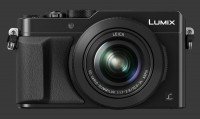
Panasonic Lumix DMC-LX100 for its unique paring of a large multi-aspect-ratio sensor and bright zoom lens. Given it was released back in 2014, it is also one of least expensive premium compact on the market.
Best Premium Compact 2017
Sony Cybershot DSC-RX100 V
The Sony Cybershot DSC-RX100 V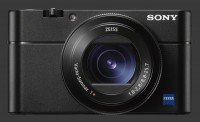
Sony Cybershot DSC-RX100 V is a marvel that delivers an unbelievable level of miniaturization. There is simply no other camera that packs so much into a truly compact body. The core of this Premium Compact is a 20 megapixels 1" Stack CMOS sensor which is paired with a bright F/1.8 - 2.8 stabilized 24 - 70mm optical zoom lens.
Its sensor and lens together allow the Sony RX100 V to capture high-quality images even in low-light where the bright aperture makes it possible to shoot at lower ISO sensitivities than typical cameras, on top of having a larger sensor. The Stacked CMOS sensor is unmatched in speed by any other premium compact. Not only does it feature a built-in 315-Point Phase-Detect AF system, it can also shoot full-resolution images continuously at 24 FPS and record 4K Ultra-HD video or 1080p Full-HD at a blazing 1000 FPS!
A Premium Compact requires a premium body and the RX100 V delivers. It offers dual control-dials, a traditional mode-dial and customizable controls. There is even 0.39" EVF with 2.4 megapixels and a tilting 3" LCD with 1.2 megapixels. Sony even packed a built-in popup flash.
The Sony Cybershot RX100 V is truly the whole package when it comes to a Premium Compact. The only thing missing from its specifications is weathersealing. Undoubtedly though, its most crucial feature is its size. This is the only camera in this class than can actually fit in a pocket.
| What you will like |
|---|
| Very low image-noise |
| Bright maximum aperture |
| Excellent lens sharpness |
| Continuous AF at 24 FPS |
| Class-leading speed |
| Large and sharp EVF |
| Incredible video capabilities |
| Extremely compact |
| What you may not like |
| Limited color accuracy |
| Short zoom reach |
| Fiddly EVF access |
| Complex menu system |
| Crowded controls and no grip |
| Internal charging only |
| Very short battery-life |
Ultra-Zoom
Ultra-Zooms are digital cameras with extremely high-powered optical zoom lenses. These cameras provide otherwise impossible versatility in a single fixed-lens design, often with an advanced feature-set and DSLR-like ergonomics. While anything above 10X optical zoom was previously considered an ultra-zoom, such lenses are available now in the much small Travel-Zooms form-factor, so here at least 20X zoom is required to make the cut.
Advancement in optics have caused the Ultra-Zoom category to split into two radically different branches. One is the classic small-sensor camera with an extreme zoom, now pushing up to 83X. The other branch is for large-sensor cameras with bright zooms having less reach but making up for it doubly by by their superior light-gathering capability. While the former are available for a few hundred dollars, the latter cost well over a thousand US dollars. The middle-ground of ultra-zooms with 2/3" sensors which used to be dominated by Fuji is no more.
Best Ultra-Zoom 2017
Sony Cybershot DSC-RX10 IV
Sony scored another one with their latest ultra-zoom, the Sony Cybershot DSC-RX10 IV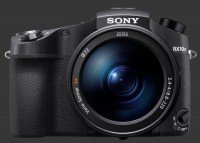
Sony Cybershot DSC-RX10 IV which incorporates the same large 20 megapixels 1" Stacked CMOS sensor as the Premium Compact RX100 V above, paired here with a bright F/2.4-4 lens, equivalent to 24 - 600mm, which gives it a 25X optical zoom.
The Sony RX10 IV boasts better image-quality than any ultra-zoom thanks its 1" sensor and brighter lens. At the wide-end, F/2.4 is only a little brighter than competitors but, at the telephoto end, a maximum F/4 aperture makes a huge difference. This Stacked CMOS sensor also delivers unmatched speed with 24 FPS shooting,4K Ultra HD video and Full 1080p video recorded at 1000 FPS! It also features a 315-Point Phase-Detect AF system built right onto the sensor.
This ultra-zoom is built for enthusiasts and is even suitable for professional use. Its DSLR-like body offers dual control-dials, a zoom-ring, a focus-ring, a top status LCD, a rear 1 megapixel LCD and a huge 0.7X magnification 0.39" EVF with 2.4 megapixels and an Eye-Start Sensor, all in a weatherproof body. The RX10 V is the only weatherproof ultra-zoom launched in the last two years.
The Sony RX10 IV is the most complete all-in one digital camera ever made. This ultra-zoom is ideal for travel photography without hassles and can handle nearly any subject down to moderately low light levels.
| What you will like |
|---|
| Very low image-noise |
| Good lens sharpness |
| Continuous AF at 24 FPS |
| Class-leading speed |
| Large and sharp EVF |
| Excellent ergonomics |
| Incredible video capabilities |
| What you may not like |
| Limited color accuracy |
| Large and heavy |
| Most expensive |
Budget Ultra-Zoom 2017
Panasonic Lumix FZ80
The Panasonic Lumix FZ80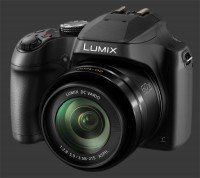
Panasonic Lumix FZ80 is based on the typical 1/2.3" CMOS sensor found in most Ultra-Zooms and Travel-Zooms. At less than a quarter the price of the Sony RX10 V, it packs quite a punch. 18 Megapixels such a small sensor is not going to win any awards for image-quality yet modern technology makes it very usable in bright light.
This ultra-zoom sports a 60X stabilized optical zoom lens. While its maximum F/2.8-5.9 aperture is rather common, what the Panasonic FZ80 brings is unmatched ultra-wide coverage of 20mm. Most ultra-zooms lenses start equivalent to 24mm which gives an angle-of-view of 84° compared to 94° for 20mm. This huge difference greatly helps with architecture, indoor and landscape photography.
The FZ80 is rather speedy for its class with a maximum burst rate of 10 FPS and an electronic-shutter that can reach 1/16000s. It is also one of the few in its class to capture 4K Ultra-HD video. As a prosumer camera, this ultra-zoom offers full manual controls, including manual focus and spot metering.
The lightweight body of the Panasonic FZ80 still offers a 0.2" EVF with 1.2 megapixels and a 3" Touchscreen LCD with 1 megapixels. There is a single control-dial plus a traditional mode dial to help control the camera.
| What you will like |
|---|
| Extremely wide-angle coverage |
| Fast and reliable autofocus |
| Unlimited 10 FPS Drive |
| Relatively light and compact |
| 4K Ultra HD video |
| What you may not like |
| High image noise |
| Smearing of fine details |
| Poor Automatic White-Balance |
| Tiny EVF |
Mirrorless
Mirrorless Digital Cameras are interchangeable lens cameras with large sensors in relatively compact bodies that omit the mirror which DSLRs use to reflect light into the viewfinder. Instead they rely on a constant feed from the sensor which lets them offer different features while facing other challenges.
Mirrorless cameras continued their explosive growth with an unmatched 30 new models launched in 2016 and 2017. These new offerings, which aim at different markets, range from highly compact viewfinder-less bodies to huge modular Medium Format ones, costing from under $500 to over $8,000 USD! Given this broad range of models and intents, the Best Mirrorless of 2017 awards are divided into 3 categories: Beginner, Advanced and Professional.
Unfortunately two new models were just announced but have not made to testing yet. The Sony Alpha A7R III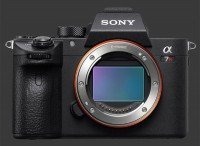
Sony Alpha A7R III and the Panasonic Lumix G9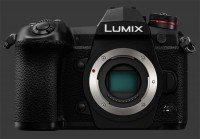
Panasonic Lumix G9, both flagship models from their respective manufacturer and the first Panasonic aimed squarely at the professional photography market. These two models will be included for consideration into next year's Best Digital Cameras.
Best Beginner Mirrorless 2017
Panasonic Lumix DMC-GX85
While rivals have been concentrating on releasing higher-end offerings to push the average selling price higher, Panasonic introduced some compelling entry-level models without much fanfare, locking in an easy win for this category.
The Panasonic Lumix DMC-GX85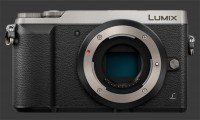
Panasonic Lumix DMC-GX85 is both one of the lightest and one of the smallest cameras among a group of already compact cameras. Despite its diminutive size, the GX85 is very feature rich, sporting a built-in EVF with Eye-Start sensor and dual control-dials at an entry-level price under $600 USD!
This mirrorless is based on a proven 16 megapixels Four-Thirds CMOS sensor without Anti-Alias Filter to maximize the amount of details captured. The sensor is mounted on a 5-axis image-stabilization system effective to 4-stops. It stabilizes all lenses at no additional cost which improves performance in low-light.
The Panasonic GX85 balances extremely well high image-quality, speed and size. Its output compares well to other Micro Four-Thirds cameras and it can both shoot continuously at 8 FPS and record 4K Ultra-HD video. Its Micro Four-Thirds mount makes it compatible with the widest selection or mirrorless lenses, many of which are much more compact than other systems due to the 2X crop-factor of Four-Thirds sensors.
| What you will like |
|---|
| Excellent image sharpness |
| Effective image stabilization |
| Reliable metering system |
| Fast autofocus system |
| Built-in EVF with Eye-Start Sensor |
| Dual control-dials |
| 4K Ultra-HD Features |
| Light and compact |
| Economical |
| What you may not like |
| Color accuracy issues |
| Poor Automatic White-Balance |
| Not Exposure-Priority |
| Underused EVF area |
| Cramped controls |
| Internal charging |
Best Advanced Mirrorless 2017
Fujifilm X-E3
Fujifilm made a bold redesign with their first series to reach a first-generation. This produced one of the smallest and most capable mirrorless cameras on the market, easily exceeding expectations.
The compact Fujifilm X-E3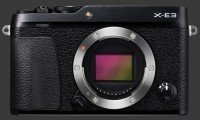
Fujifilm X-E3 is based on the latest 24 megapixels APS-C X-Trans CMOS III sensor with built-in Phase-Detect AF. This is the same sensor as on their flagship X-T2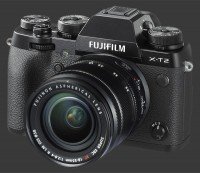
Fujifilm X-T2 yet in a surprisingly small body that manages to include a large 0.62X magnification 0.39" EVF with 2.4 megapixels and an Eye-Start Sensor plus dual control-dials. The unique trick Fujifilm used was to remove the ubiquitous 4-way controller and let an 8-way joystick take over, resulting in much liberated space at the back of the camera.
Image quality from the X-E3 is superb with very low image-noise, excellent colors, class-leading dynamic-range and a highly reliable metering system. This mirrorless is very fast too, achieving a top continuous shooting speed of 14 FPS or 8 FPS with a mechanical shutter. Its sensor is also capable of recording 4K Ultra-HD video which it does with ease.
The 325-Point hybrid Phase-Detect and Contrast Detect autofocus system is incredibly quick and accurate. It can track faces and eyes across the screen with more ease than previous generations.
While its ergonomics are controversial, and not without quirks, they undoubtedly work. After a short learning curve, the X-E3 becomes one of the most efficient digital cameras in its class. Very few cameras deliver such well-rounded performance as the Fujifilm X-E3.
| What you will like |
|---|
| Very low image noise |
| Wide dynamic-range |
| Reliable metering system |
| Ultra-fast autofocus system |
| Instant shutter-lag with virtually no blackout |
| Excellent shot-to-shot speed |
| Instant video response |
| Solid build quality |
| What you may not like |
| Aggressive noise-reduction |
| Not Exposure-Priority |
| Misleading EVF Preview |
| Complicated Shutter-Speed control |
| Very short battery-life |
Best Professional Mirrorless 2017
Sony Alpha A9
While the first decade of mirrorless cameras was used to deliver on their initial promise, to match DSLR image quality in a smaller form-factor, the last two have been used to exceed them.
The Sony Alpha A9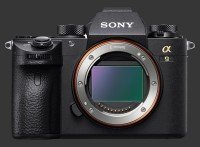
Sony Alpha A9 is the mirrorless that breaks the limits of professional DSLRs. The A9 features a 24 megapixels Full-Frame Stacked CMOS sensor with an incredible 693-Point Phase-Detect AF system built-in. This sensor is so fast than it can deliver full-resolution images at 20 FPS for a extensive 362 JPEG images or 241 RAW files.
A built-in 5-axis image-stabilization system, effective to 5 stops, stabilizes all lenses mounted on the A9. Combined with a standard ISO 100-51200 sensitivity range, expandable to ISO 50-204800, it pushes the boundaries of low-light performance. Its relatively large pixels give the Sony A9 impressive dynamic-range, although not quite best-in-class.
The real deal with the Sony A9 is its unprecedented speed throughout the imaging pipeline. Its 20 FPS drive maintains full tracking autofocus between frames and shows a continuous image without any blackout a best-in-class 0.78X magnification 0.5" EVF with an incredible 3.6 megapixels and an Eye-Start Sensor. This EVF shows virtually no lag as it gets refreshed at 120 FPS.
The hybrid autofocus system in the A9 can tracking minute changes in focus to keep an eye in sharp focus while a subject is moving. Its wide coverage allows good freedom to compose. The ergonomic body of the Sony A9 is designed for efficiency, featuring triple control-dials, a mode-dial, drive mode dial, focus mode dial and dedicated EC dial. The whole camera is built to last with a durable weatherproof body.
The final ace of the Sony Alpha A9
Sony Alpha A9 is a hybrid shutter that becomes completely silent in electronic-mode. Unlike other electronic-shutters, this one is read so quickly that rolling shutter is minimized thanks to the stacked CMOS sensor design. At over $4000 USD, there is hefty price to pay for the A9, yet that can easily be justified by professionals for its unparalleled performance.
| What you will like |
|---|
| Excellent image quality |
| Low image noise |
| Versatile metering modes |
| Extremely fast and accurate autofocus |
| Instant shutter-lag with no blackout |
| Class-leading continuous drive |
| Really deep memory buffer |
| Highly effective image-stabilization |
| Completely silient shooting |
| Best-in-class Exposure-Priority EVF |
| Excellent controls and ergonomics |
| Solid build quality |
| What you may not like |
| Automatic White-Balance not always neutral |
| Lossy RAW compression |
| Second SDXC slot not UHS-I |
| Unimpressive battery-life |
| Very pricey |
DSLR
DSLRs are the benchmark of digital cameras. Over the past two years, 18 new models have been released, refining and improving on image-quality and performance. All DSLRs produce high-quality images and are suitable for all sorts of photographic subjects. Entry-level offerings are well-rounded with intermediate-to-high-end ones delivering better and more impressive performance.
Best Entry-Level DSLR 2017
Pentax KP
Pentax has a long history of producing the best value among DSLRs. Now under Ricoh Imaging, the tradition continues with Pentax KP which provided an unmatched feature-set at its price-point, now just under $1000 USD.
The Pentax KP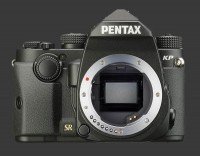
Pentax KP sports a 24 megapixels APS-C sensor mounted on a 5-axis image-stabilization system effective to 5 stops. Its unique high-sensitivity sensor covers an ISO 100-819,200 sensitivity-range at full-resolution. Its hybrid shutter reaches a class-leading 1/24000s, the highest shutter-speed on any DSLR.
The body of the Pentax KP is substantially better than comparatively priced DSLRs. It and its smaller sibling, the Pentax K-70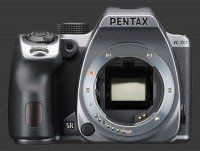
Pentax K-70, offers the largest and only 100% coverage viewfinder, the only weatherproof and freezeproof (-10C) body and the only built-in Shake Reduction and Automatic Horizon Correction in their class. Plus, the KP offers triple control-dials among cameras where dual control-dials are even rare!
Justifying its place above the K-70 is not just an extra control-dial but a completely different 27-Point Phase-Detect AF system. The KP also improves upon the sensitivity, stabilization and continuous drive.
Image quality of the Pentax KP
Pentax KP is superb with very low image-noise, good dynamic-range and realistic colors. Sharpness is maximized by omitting an anti-alias filter which can be simulated, if needed, by the built-in Shake-Reduction mechanism. There is really not much the KP cannot do. The main difference between it and a professional body is its lighter-weight and less durable construction.
| What you will like |
|---|
| Great image quality |
| Very high sensitivity |
| Reliable metering |
| Quite fast and responsive |
| Built-in Shake Reduction |
| Automatic Horizon Correction |
| 100% Coverage viewfinder |
| Weather-sealed body |
| Triple control-dials |
| What you may not like |
| Not as ergonomic as other Pentax DSLRs |
| Tilting display makes it less durable |
| Relatively short battery-life |
| Comparatively limited lens lineup |
Anything above entry-level among DSLRs is completely suitable for professional use. With the KP above offering such a great feature set, it brought the semi-professional down to its price-point. What happens at this point is that DSLRs have branched with a choice between better image-quality or faster speed. Next, among DSLRs below $2000 we have an unusual tie between the fasted APS-C DSLR and one of the best Full-Frame offers for exactly the same price.
Best Enthusiast APS-C DSLR 2017
Nikon D500
The Nikon D500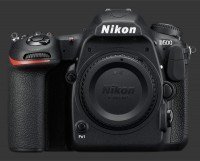
Nikon D500 continues a historic line of APS-C DSLRs built for speed. With its 20 megapixels CMOS sensor having a standard ISO 100-51200 sensitivity, expandable to a jaw-dropping ISO 50-1,6384,00, the D500 is the second most-sensitive ever built, after a much larger and more expensive full-frame Nikon D5.
This DSLR delivers on all fronts with an ultra-fast 153-Point Phase-Detect AF system sensitive to -4 EV and a 10 FPS continuous drive that can capture 200 RAW files or JPEG images in a single burst.
The D500 is large even by DSLR standards, with direct controls for nearly everything, including dual control-dials, an 8-way focus joystick, a huge 1X magnification OVF with 100% coverage and a built-in Eye-Shutter. Its body is built like a tank to be durable and withstand adverse weather-conditions and keep going for 1240 shots on a single battery-charge!
There are no types of photography that the Nikon D500 cannot excel at. Its Nikon F-mount gives it access to one of the largest lens lineups in the industry, plus its hot-she and sync-port allow for a variety of external lighting options. There is no built-in flash on the D500 but that is unlikely to be missed due to its incredible sensitivity.
The Nikon D500
Nikon D500 is one of the few 4K-capable DSLRs out there. It can record both standard videos and time-lapse in Ultra-HD. It offers a rather advanced features such as 9-frame bracketing, a sophisticated interval timer, 10-frame multiple-exposure and customizable timers plus WiFi, Bluetooth and NFC.
Among DSLRs or any type of camera, the Nikon D500 turns in a nearly perfect performance on all fronts, easily earning our highest rating.
| What you will like |
|---|
| Superb image quality |
| Very high sensitivity |
| Exceptional dynamic-range until ISO 800 |
| Ultra-fast autofocus with nearly total coverage |
| Fast continuous drive with deep buffer |
| Ultra-short black-out |
| Built-in OVF shutter |
| Illuminated controls |
| What you may not like |
| Some metering issues |
| Cast with Auto White-Balance in low-light |
| Poor Live-view implementation |
| 1.5X crop for 4K |
| Asymmetric memory-cards slots |
| Full-frame size and price |
Best Enthusiast Full-Frame DSLR 2017
Pentax K-1
Ricoh delivered the first Pentax full-frame DSLR early last year, bringing a unique camera into a market split almost evenly between the two biggest names of the camera industry.
The Pentax K-1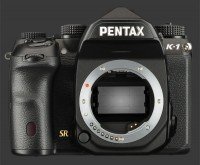
Pentax K-1 sports a 36 megapixels Full-Frame CMOS sensor with an ISO 100-204800 sensitivity range. The K-1 brings back image-stabilization to full-frame DSLR for the first time since Sony exited that market. This new Shake Reduction system is much more sophisticated though with 5-axis effective to 5-stops of stabilization. This gives the K-1 many features unique to Pentax DSLRs: Automatic Horizon Correction, Anti-Alias Filter Simulation, Pixel Shift Resolution Capture and Astrotracer function with the assistance of a built-in GPS, all for the first time in a full-frame model.
This DSLR is extremely feature rich and the most rugged of all. Not only does it sport an extremely weatherproof design, it is the only freezeproof full-frame DSLR. The rear LCD is mounted on a unique system of 4 axis which is strong enough to support the entire weight of the camera. The body features triple control-dials, also for the first time on a full-frame DSLR and a large 0.7X magnification 100% coverage viewfinder, plus a high number of external controls.
Although it costs less than the vast majority of full-frame cameras, the Pentax K-1 packs a truly rich feature-set. This includes GPS with Digital Compass that records position, elevation and orientation and can compensate for the rotation of the Earth during long exposures to avoid star-trails. Standard video is limited to 1080p at 30 FPS but Time-Lapse Video is available at 4K Ultra-HD resolution.
Speed is the compromise taken by Ricoh. While the K-1 features a modern 33-Point Phase-Detect AF system, it is not particularly fast, nor is the 4.4 FPS continuous drive speed. Even at that pace, the K-1 can only buffer 70 JPEG images or 17 RAW.
The Pentax K-1
Pentax K-1 produces top-notch images with extremely low noise, class-leading dynamic-range, excellent color, neutral white-balance and reliable metering. This makes the K-1 ideal for anything but action photography. The combination of built-in stabilization plus wide sensitivity range make it one of the best digital cameras for low-light photography.
| What you will like |
|---|
| Spectacular image quality |
| Excellent rendition of details |
| Very low image noise |
| Class-leading dynamic-range |
| Reliable metering |
| Quite fast and responsive |
| Highly effective Shake Reduction |
| Automatic Horizon Correction |
| Astrotracer using GPS and Compass |
| Exceptionally weatherproof and freezeproof |
| Triple control-dials |
| Built-in illumination |
| What you may not like |
| Slow autofocus system |
| Limited continuous drive |
| Poor Live-View implementation |
| Minimal modern lens lineup |
At the top-most level of DSLRs, manufacturers have two parallel flagship models. One model is built for maximum resolution, while the other is built for speed. Speed is acheived at lower resolution to increease throughput and buffer-depth, which incidently delivers better low-light performance. These models are not in competition with each other, making it impossible to call one absolutely better than the other.
Nikon introduced their top high-performance DSLR in January 2016 and a new flagship high-resolution DSLR in late August 2017. Both of these are best-in-class. The D5 XQD review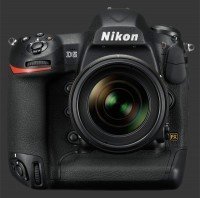
Nikon D5 XQD was already completed but the D850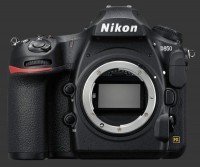
Nikon D850 is yet to come. That is the camera landscape and architecture photographers should be buying.
Best Professional Action DSLR 2017
Nikon D5 XQD
Nikon launched 3 new DSLRs in early 2016, their flagship D500 winning above for Best Enthusiast APS-C DSLR, plus a D5 which comes in two variants, one with dual XQD card slots and one with dual CompactFlash ones. These are otherwise identical except that the XQD variant clears its buffer faster.
The Nikon D5 XQD
Nikon D5 XQD is the workhorse of action photography. It is built to shoot quickly for long periods and able to repeat this faster than any other DSLR. Action photography means fast burst rates but also fast shutter-speed and high-sensitivity to make those possible.
To this effect, Nikon built best-in-class capabilities into their D5. At its core is a 20 megapixels Full-Frame CMOS sensor with an ISO 100-102,400 standard sensitivity range, expandable to a stellar ISO 50-3,276,800, a capability unmatched by any digital camera. This puts it ahead of all competitors when it comes to action in low-light.
Sporting one of the fastest mechanical shutters among DSLRs, the Nikon D5 twins can both shoot continuously at 12 FPS with full continuous 3D Tracking from their 153-Point Phase-Detect AF system. The mechanical shutter can even reach 14 FPS when the mirror is locked up. These DSLRs offer a deep buffer for 200 JPEG images or 180 RAW files, or otherwise around 15 seconds of maximum speed continuous shooting! The XQD model clears its buffer a little fast than the CF one.
The D5 offers every feature needed by professionals with a huge amount of flexibility. See the in-depth Nikon D5 XQD review for the complete and rather lengthy list. Stand out features include Highlight Weighed Metering, the most sophisticated Interval Timer and Time Lapse features of any camera, including 4K Time-Lapse output and 4K Ultra-HD video.
The Nikon D5 XQD
Nikon D5 XQD is truly built like a tank. Its extremely rugged body is weatherpoof and offers dual grips, each with dual control-dials and an 8-way joystick, plus many customizable buttons, two status LCDs, a huge 3.2" LCD with a class-leading 2.4 megapixels, a large 0.72X magnification 100% viewfinder with built-in Eye-Shutter. Many of its buttons are illuminated and there are ports to connect just about anything: Wired Remote, GPS Unit, WiFi Unit, 4K HDMI, Stereo lines in and out, USB 3.0 and Gigabit Ethernet to access the internal HTTP and FTP servers. Not only is the D5 designed for speed of photography, it is made to speed up the entire action photographer's workflow!
| What you will like |
|---|
| Very smooth JPEG rendition |
| Outstanding high-ISO dynamic-range |
| Ultra-fast 153-Point Autofocus system |
| Extremely senstive AF |
| Very fast continuous drive with deep buffer |
| Ultra-short black-out |
| Good color-accuracy |
| Superb build quality |
| Reliable metering |
| Built-in illumination |
| What you may not like |
| Noisy RAW files |
| Poor Automatic White-Balance in low-light |
| Limited AF-coverage |
| Poor Live-view, not Exposure-Priority |
| 1.5X crop for 4K |
| Huge and expensive |
Please Support Neocamera
All information on Neocamera is provided free of charge yet running this website is a huge endeavor. Purchases made via affiliate links found throughout the site help keep it running and up-to-date. There is no additional cost to you, so please consider buying via these links to our affilates:
If you found any information on this site valuable and did not purchase via our affiliate links, please considering donating via PayPal:
Any amount will be greatly appreaciated. Thank you for your support!
Updates
2025.01.18

Fujifilm GFX 2025 Lens Roundup
Lens Review roundup of Fujifilm GFX Medium-Format lenses. Quality, performance and handling of the GF20-35mm F/4R WR, GF30mm F/3.5 Tilt-Shift and the GF55mm F/1.7.
2024.11.18

Best 2024 Photography Gifts for Every Budget
Great gifts for photographers and photo enthusiasts selected for every budget among the best products of 2024.
2024.08.07

Eye Protection Tips for Professional Photographers
The four main considerations for professional photographers regarding eyewear.
2024.07.14

Fujifilm X100VI Review
Flagship fixed-lens compact digital camera with a 40 MP sensor and Image-Stabilization, a first for the series. Retro design featuring dual control-dials, plus direct ISO, Shutter-Speed and EC dials. Its hybrid viewfinder can switch between EVF and OVF mode.
2024.05.09

Fujifilm GFX100 II Review
Flagship 102 Megapixels Medium-Format Mirrorless Digital Camera with 8-Stop 5-Axis IBIS, 8 FPS Drive, 8K Video and 400 MP Super-Resolution capture in a weatherproof and freezeproof body with dual control-dials and dual memory-card slots.
2024.04.03

Fujifilm X-T5 Review
Newest Fujifilm flagship boasting a 40 MP APS-C sensor, 5-axis IBIS with 7-stop efficiency, 15 FPS continuous drive, 6.2K Video capture, dual control-dials and dual SDXC UHS-II slots in a sturdy weatherproof and freezeproof body.
2023.11.20

Best Digital Cameras of 2023
Find out which are the Best Digital Cameras of 2023. All the new Mirrorless Digital Cameras from entry-level to high-end professional.
2023.07.10

Fujifilm X-H2 Review
40 Megapixels APS-C Hybrid Mirrorless Digital Camera with 7-stop IBIS. Fastest shutter ever and 8K video capture. Large builtin EVF with 0.8X magnification and 5.8 MP, plus an Eye-Start Sensor. Packed with features and large number of controls in a weatherproof and freezeproof body.
2023.05.07

Sony FE 20-70mm F/4G Review
Review of the unique Sony FE 20-70mm F/4G lens. The optical zoom of this lens spans ultra-wide-angle and medium focal-length coverage, making it one of the most versatile Full-Frame lenses on the market.
2023.01.15

Huion Inspiroy Dial 2 Review
Review of the Huion Inspiroy Dial 2 tablet, a medium sized drawing surface with dual dials and customizable buttons. Connects via USB-C or Bluetooth 5.0 with Windows, Linux and Android support.
2022.12.08

How to Pack for a Photo Trip
Find out how to pack for a travel photography trip, carry your gear safely while meeting airline regulations.
2022.11.13

Best Digital Cameras of 2022
The best digital cameras of 2022. A short list of the most outstanding models in their respective categories. Choose one for yourself or as a gift.
2025.01.18
2024.11.18
2024.08.07
2024.07.14
2024.05.09
2024.04.03
2023.11.20
2023.07.10
2023.05.07
2023.01.15
2022.12.08
2022.11.13
NEWS
2025.04.22

Sony Unveils Brightest Full-Frame Telephoto Zoom Lens
Lens
2025.04.03

Nikon Released Second Generation Z5 Full-Frame Mirrorless
Digital Camera
2025.03.26

Canon Launches Pair of Cameras and Lenses
Digital Camera ○ Lens
2025.03.25

Venus Optics Launches Vista Vision Cine Lenses
Lens
2025.03.24

Think Tank Photo Walker Pro
Bag
2025.03.20

Fujifilm First Fixed Lens Medium-Format Camera
Digital Camera
2025.02.26

Sony Launches Two New Lenses at CP+2025
Lens
2025.02.25

CP+2025 Showcases Numerous Launches
Digital Camera ○ Lens
2025.02.13

Nikon Launches 5X Full-Frame Power-Zoom Lens
Lens
2025.02.05

Nikon Refreshes Flagship Ultra-Zoom
Digital Camera
2025.02.05

Nikon Launches Ultra-Bright 35mm F/1.2 Prime Lens
Lens
2025.01.21

Fujifilm Evolves INSTAX Wide
Digital Camera



